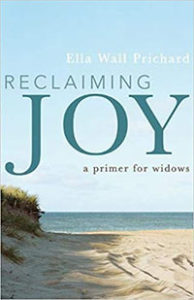Ella Prichard wrote Reclaiming Joy as a practical guide for widows—the book she needed but could not find when her husband of 46 years, Lev, died in 2009.
At the time, she felt unprepared for widowhood. She considered herself unequipped to assume leadership of the Corpus Christi-based oil and gas company he headed. She also struggled to cope with the emotional, spiritual and psychological challenges of bereavement.

Prichard found solace in Scripture—particularly the Gospel of John, the Psalms and the Apostle Paul’s letter to the Philippians—but little help in popular Christian books.
“There wasn’t a book for me. So many so-called Christian books are just filled with devotional platitudes,” she said. “I was not happy that Lev was in heaven singing with the angel choir. I wanted him here.”
Prichard, who studied journalism at Baylor University, had written extensively throughout her married life—everything from Sunday school curriculum to promotional material for nonprofit capital campaigns.
So, she began writing about her experiences in brief essays posted on Facebook and in tweets on Twitter.
“I found out Twitter is a wonderful place to scream out your pain in 140 characters,” she said.
In the process, she discovered an online community of women on similar journeys. While no two widows’ experiences are identical, some aspects of living with loss are universal, she noted.
“What you think is personal and unique turns out to be common,” she said. “Google it, and you find thousands of hits.”
Sign up for our weekly edition and get all our headlines in your inbox on Thursdays
Out of that experience, she decided to write a guide for dealing with the challenges widows face.
“I didn’t set out to write a Christian book. I set out to write a practical book,” she said.
Even so, Reclaiming Joy: A Primer for Widows uses the New Testament book of Philippians as its framework.
“I didn’t intend to write a memoir, but all I really had to offer was my own experiences and my own reactions to Philippians,” she realized.
‘The empty chair’
Initially, she thought about titling the book, “Rejoice!” However, reflecting on her experience, she realized how offensive that suggestion would be to someone who just experienced profound loss.
 Instead, she wanted to present the steps she took toward reclaiming the joy she lost when her husband died.
Instead, she wanted to present the steps she took toward reclaiming the joy she lost when her husband died.
Some readers think of Philippians only in terms of Paul’s emphasis on joy and “just hit the high notes,” Prichard said. More careful study revealed the epistle deals with overcoming discouragement and a variety of other challenges.
“It is filled with practical advice to a church with practical problems,” she said. “I began to recognize the darker parts.”
Prichard’s Christian faith provided the foundation that enabled her to move from intense pain to a new sense of joy, and she recognized Jesus was with her in the midst of her suffering. Still, she told her pastor at one point, “Jesus doesn’t sit across from me at the dinner table.”
She honestly acknowledged “the black hole that never goes away” and the ever-present reminder of “the empty chair.”
From the Psalms, she found permission to voice questions and complaints to God.
“Perfect people aren’t believable,” she said. So, she transparently chronicled her experiences, including missteps along the way.
Rather than viewing grief as lack of faith, she found help in the Apostle Paul’s words in 1 Thessalonians 4:3. Paul did not tell the Thessalonian Christians not to grieve, she noted. Rather, he told them not to grieve as nonbelievers “who have no hope.”
While Christian Scriptures are woven throughout the book, Prichard believes people from a variety of faith backgrounds will relate to her experiences and find them helpful. She pointed to a “devout Jew” who told her he intends to give one copy to his widowed mother-in-law and another to his wife.
“I hope it speaks to those of other faiths and those who are just vaguely spiritual,” she said.
Taking note of lessons learned
Prichard divided the book into four sections, drawn from Philippians and affirmed by her personal experience: “Love overcomes fear.” “Unity strengthens relationships.” “Maturity brings wisdom.” “Peace leads to joy.”
Each of its 28 chapters ends with a particular lesson she learned, such as:
- “We almost surely will encounter those who do not have our best interests at heart; but with God’s help, we can find the wisdom and courage to resist them, while not allowing them to make us bitter or untrusting.”
- “Getting one’s priorities in order—learning to do what must be done without neglecting what really matters in life—requires self-awareness, time management and extraordinary self-discipline.”
- “Our pretense of strength as new widows is the mask we wear to hide our weakness and vulnerability. Only when we acknowledge our discontent with our new role and admit that we are powerless to change our circumstances will we be ready to draw strength from our family, friends and faith. Then we can find contentment.”
Prichard learned the importance of finding balance. Exercise caution, but don’t live in fear. Take time for self-care, but grow to focus less on one’s own loss and more on the needs of others. Recognize solitude is a gift, but isolation is “the worst thing in the world,” she said.
“I’ve learned to look at my calendar, preferably a week out, at least at the beginning of the day, and to be sure I take a moment to escape drudgery and isolation,” she said. “Even going to the grocery store or out to eat by myself gets me out of the house and among people.”
She makes it a point to take breaks from the necessary work that must be accomplished, whether that means walking outdoors, enjoying a cup of coffee or calling a friend on the phone. She engages in some “pleasant and relaxing” activity and takes a step to “connect with other people somehow,” she said.
Prichard’s book begins with an emphasis on grace and gratitude. It ends with an emphasis on generosity and grace. In part, she noted, that reflects Paul’s writing in Philippians, but it also grew out of her personal journey back toward joy.
“You have to understand grace before you understand the rest,” she said.
Reclaiming Joy: A Primer for Widows is published by 1845 Books, an imprint of Baylor University Press. Its release date is Sept. 15, but the publisher is accepting pre-orders.
















We seek to connect God’s story and God’s people around the world. To learn more about God’s story, click here.
Send comments and feedback to Eric Black, our editor. For comments to be published, please specify “letter to the editor.” Maximum length for publication is 300 words.